Who Is the Irish God of Music?
Who is the Irish God of Music? In many cultures worldwide, gods and goddesses are often linked to music and seen as divine figures who inspire creativity and harmony through sound. From the Greek god Apollo, who played the lyre, to the Roman goddess of wisdom, Minerva, who was associated with the flute, music has always been an essential part of mythology.
However, in Irish mythology, there isn’t one single “Irish god of music.” Instead, music is an integral part of many gods and goddesses, with each one bringing their own magical, spiritual, and emotional connection to the art. Music in Irish culture was believed to have the power to heal, inspire, and influence the world around us. In this post, we’ll explore the Irish gods and goddesses tied to music and how their divine abilities reflect the importance of music in Irish life and mythology.
Table of Contents
The Role of Music in Irish Mythology
In ancient Ireland, music was more than just entertainment—it was an essential part of life and culture. Music played a crucial role in rituals, storytelling, and even healing. The Irish believed music had magical powers, often used to connect with the divine or influence the natural world.
Music was seen as a way to communicate with the gods in religious rituals and ceremonies. It was used to invoke the gods’ favour, mark important occasions, or honour the spirits of nature. The sound of music was thought to bring people closer to the spiritual world, making it a sacred part of everyday life.
Storytelling was another area where music held great importance. The ancient Irish were known for their rich oral storytelling tradition, and music often accompanied these tales. Bards, skilled poets and musicians would sing or recite stories while playing instruments like the harp or the lyre. These performances were meant to entertain and preserve history, pass on knowledge, and keep the connection to the past alive. Music helped bring the stories to life, adding depth and emotion to the words.
Music also had a powerful healing aspect. Certain songs and melodies were believed to soothe the mind, ease pain, and even cure illness. The Irish saw music as a form of magic that could influence physical and emotional realms. In some myths, gods and goddesses used music to heal or change humans’ hearts, showing how deeply music was woven into the fabric of Irish mythology.
For the ancient Irish, music wasn’t just something people made—it was a divine gift. This magical force connected them to the gods and to the natural world. It was a powerful tool for everyday life and spiritual connection, carrying the gods’ voices.
Lugh: The Master of Arts and Music
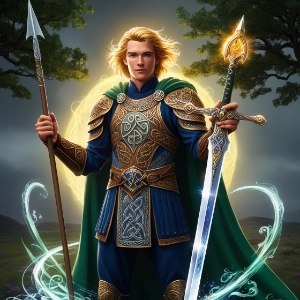
Lugh is one of the most well-known and celebrated gods in Irish mythology. He is often called the “Bright One” or “The Long-Handed,” he is famous for his incredible skills in many different areas. Known as a multi-talented god, Lugh is associated with everything from warfare and strategy to crafts, poetry, and music. He symbolises creativity, mastery, and the power of the arts.
Lugh is a key figure in the Tuatha Dé Danann, the mystical race of gods and goddesses skilled in various forms of magic and knowledge. As a member of this influential group, Lugh embodied the idea of mastering every art and craft. Whether it was crafting weapons, weaving spells, or creating beautiful music, Lugh was considered a master of them all. His ability to excel in many areas made him a respected and powerful figure among the gods.
When it comes to music, Lugh’s talents were just as impressive. He was known to inspire creativity and bring harmony to the world with his artistic skills. Though specific myths don’t always detail what instruments Lugh played, his connection to music is clear through his role as a god who governs the arts. Lugh was believed to bring music into the world as a force that could inspire both people and the gods. His presence in stories suggests that he could evoke deep emotions and inspire others to create, whether through song, dance, or poetry.
In some accounts, Lugh is seen as the leader of the Fían, a group of skilled warriors and artists, further cementing his association with music and the arts. The idea that he could inspire the creation of beautiful melodies and music shows his power to influence both the mind and spirit. His gifts were about mastery of the arts and sharing that talent with others, allowing music to spread to bring peace and unity.
Lugh’s association with music in Irish mythology highlights the importance of creativity and the divine gift of artistry. He wasn’t just a god of war and strategy—he was a symbol of the beauty and power that music, and the arts in general, could bring to the world.
Brigid: The Goddess of Poetry, Healing, and Music
Brigid is one of the most important goddesses in Irish mythology, known for her powerful influence over poetry, healing, and fire. As a goddess of creativity and inspiration, Brigid was deeply connected to the arts, including music. In ancient Irish culture, music and poetry were often intertwined. Brigid was seen as the muse who inspired both poets and musicians alike.
Brigid’s role as the goddess of poetry is especially significant because, in ancient Ireland, music and poetry were not separate but closely linked. Poets, or filí, were highly respected members of society, and they often composed their works in song form, playing instruments like the harp as they recited their verses. Music was seen as a form of poetic expression, and Brigid, as the patroness of poetry, also held a special connection to the musical arts. She was believed to have inspired the creation of beautiful songs and poems that would touch the hearts and spirits of those who heard them.
As a goddess of healing, Brigid also had a unique connection to music’s emotional and restorative power. In Irish mythology, music was seen as a tool for healing the mind and body. The soothing sounds of a song or a melody could calm the soul and ease physical pain. Brigid’s healing influence extended to music’s magical ability to bring balance and peace. She was thought to inspire the creation of music and its ability to heal and restore harmony to those who needed it most.
Brigid’s connection to fire further emphasises her role as a bringer of inspiration and creativity. Fire is often associated with transformation, warmth, and illumination, all qualities reflected in music’s power. Just as fire brings light and warmth, music, under Brigid’s guidance, could inspire people and transform their emotions, bringing peace, joy, and even healing.
Through her patronage of poetry and music, Brigid was seen as a goddess who nurtured creativity and helped bring balance to the world. Whether through the calming effect of a song, the beauty of a poem, or the warmth of a fire, Brigid’s influence was felt in the artistic and emotional life of ancient Ireland.
Dagda: The All-Father with the Magical Harp
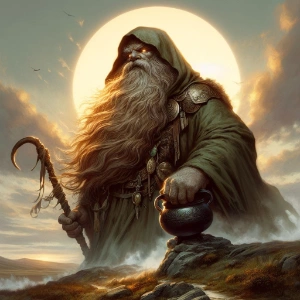
The Dagda is one of the most important gods in Irish mythology, often called the “All-Father” because of his role as the father of the gods. He is associated with wisdom, abundance, and fertility but is also deeply connected to music. One of his most famous possessions is his magical harp, Uaithne, which plays a significant role in his connection to the natural world and the power of music.
The Uaithne was no ordinary harp. It was said to have the power to control the seasons, making it a symbol of Dagda’s connection to the cycles of nature. When played, the harp could change the seasons, bringing either springtime warmth or winter chill with a single note. This ability to control the weather and the natural world shows how powerful music was believed to be in ancient Irish mythology. Through the Uaithne, Dagda’s music could influence not just the emotions of people but the very forces of nature itself.
In addition to its control over the seasons, the Uaithne was also said to have the ability to stir emotions. It could bring joy, sadness, or peace, depending on how it was played. In Irish mythology, music’s power to influence emotions highlights the deep connection between the human heart and the natural world. Just as the harp could bring the changing seasons, it could also change the mood of those who listened to it. In Dagda’s hands, music was a tool of transformation and harmony, capable of bringing balance to the world.
The harp was a central instrument in Irish culture and mythology, and its connection to Dagda makes it even more significant. Harps were not just musical instruments but symbols of magic, beauty, and power. In Irish society, bards and musicians often played the harp to accompany their poetry and songs, and it was considered an instrument that could connect people to the divine. Dagda’s Uaithne represents this magical power, showing that music was not just an art form but a powerful force that could shape the world.
Through his magical harp, Dagda reminds us of the profound impact that music can have on both the physical world and the emotions of the human heart. His connection to the harp reinforces the idea that music was a divine gift in Irish mythology, capable of bringing both creation and transformation.
The Absence of a Specific “Irish God of Music”
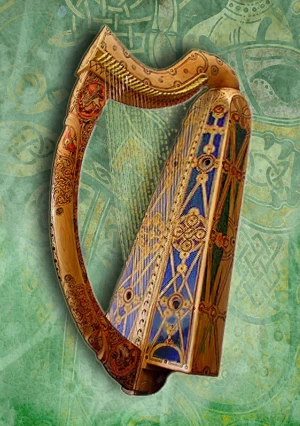
A singular god or goddess is often dedicated to music in many other mythologies. For example, in Greek mythology, Apollo is the god of music, art, and the sun, overseeing the entire domain of music. However, in Irish mythology, there isn’t a single “Irish god of music” in the way that we might expect. Instead, music is woven into several gods and goddesses’ identities and powers, showing how important it was across different aspects of life and nature.
Rather than having one deity who controls all things musical, music in Irish mythology is seen as a collective gift of the gods, shared by many. Gods like Lugh, Brigid, and Dagda all have a connection to music, but each in a different way. Lugh is the master of all arts, inspiring creativity and harmony through his talents. As the goddess of poetry and healing, Brigid connects music to emotional balance and spiritual inspiration. With his magical harp, Dagda links music to the cycles of nature and the power to influence the world. Each of these deities brings something unique to the realm of music, showing that it wasn’t owned by one god alone but was an essential and divine force that belonged to all.
This approach to music suggests that it was not just a form of entertainment or art but a powerful and spiritual gift from the gods meant to be shared. Music in Irish culture was intertwined with poetry, healing, and even the changing of the seasons, showing its wide-ranging importance. By making music a part of the lives and powers of several deities, Irish mythology reflects how music was deeply connected to various domains—art, emotion, nature, and magic. It couldn’t be confined to just one god but connected all gods and aspects of life.
In this way, music in Irish mythology is seen as a collective force, a shared gift of the gods that affects and influences every part of the world. While there might not be a single “Irish god of music,” music itself is vital to the very fabric of Irish mythology and life.
Instruments of the Gods
In Irish mythology, music wasn’t just about sound but also about the magical instruments the gods and goddesses used to connect with the world around them. Each of these instruments held great power and symbolised the gods’ influence, not just in the human world but also in the divine realm.
In Irish mythology, look at some key instruments associated with the gods.
Lugh’s Connection to the Arts and Music
Lugh, the god of many arts and skills, is often linked to the creative power of music, though specific instruments aren’t always named in the myths. However, we can imagine Lugh using instruments that reflect his mastery of all things artistic, including music. Lugh was known for his ability to inspire and create harmony across different domains, so he likely played instruments that helped bring out the beauty of music, poetry, and the arts. His connection to music isn’t about a particular instrument but about the power of art itself. Lugh’s influence encouraged others to create and perform, making music an essential part of his legacy.
Brigid’s Association with Poetic Chants and Musical Inspiration
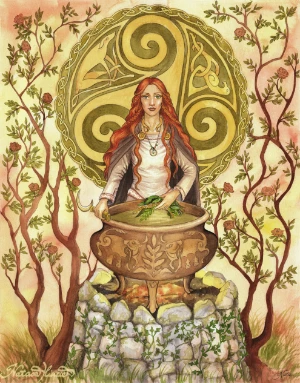
Brigid, the goddess of poetry, healing, and fire, also has ties to music, primarily through the art of chanting. In ancient Ireland, poetry and music were closely linked. As the muse of poets, Brigid would inspire both poetic words and the music accompanying them. While there’s no specific instrument directly tied to Brigid, we can imagine her connection to the voice. This human instrument conveys both words and song. The chanting of poetry or the singing of songs was an essential part of ancient rituals and storytelling. Brigid’s role as a muse for poets and musicians was vital in inspiring the creation of beautiful melodies and verses that would resonate with both the heart and the spirit.
Dagda’s Uaithne, the Magical Harp
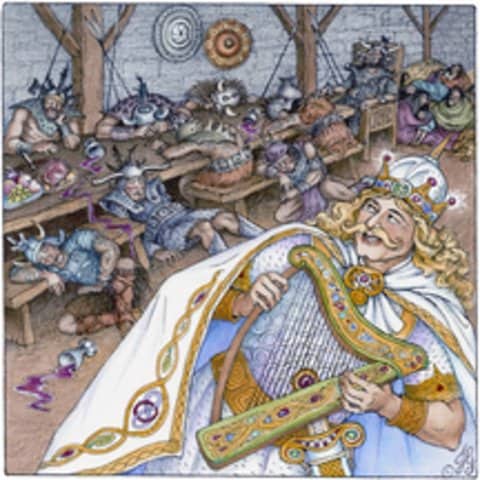
Dagda, the All-Father of the gods, is most famously associated with his magical harp, Uaithne. This harp wasn’t just any musical instrument—it was a powerful tool with the ability to control the seasons and emotions. The Uaithne could change the weather with its music, bringing the warmth of spring or the chill of winter. This ability to influence the natural world shows the magical power of music in Irish mythology. The harp also could stir deep emotions, bringing joy, sorrow, or peace to those who heard it. Through his Uaithne, Dagda showed how music could connect both the human heart and the forces of nature. The harp symbolised Dagda’s role as a god who could bring balance, abundance, and harmony to the world.
Each instrument—Lugh’s artistic influence, Brigid’s poetic chants, or Dagda’s magical harp—represents the deep connection between music and the divine. These instruments were more than just tools for making sound; they were symbols of the gods’ powers to shape emotions, change the world, and inspire people. Music was not just an art in Irish mythology; it was a force that could influence both the human heart and the natural world, making these instruments central to the gods’ powers and legacies.
Music’s Role in Irish Religion and Ritual
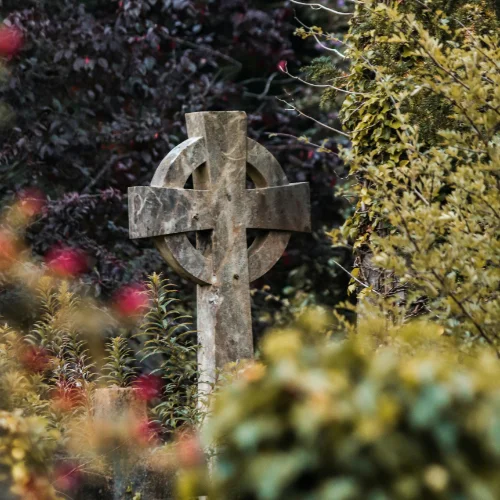
In ancient Ireland, music played a crucial role in religious rituals, ceremonies, and festivals. It wasn’t just about entertainment—it was a powerful tool used to connect with the gods, invoke emotions, and influence the forces of nature. Music was seen as a way to communicate with the divine and bring about change, whether through healing, blessings, or even the changing of the seasons.
Music often honoured the gods during religious ceremonies and called forth their presence. Instruments like the harp, the lyre, and flutes were played to invoke the gods’ favour, asking them for good harvests, protection in battle, or blessings for the people. The sound of music was believed to have the power to bring the divine closer, creating a bridge between the human and spiritual worlds.
Music often marked Festivals and rituals, with songs and chants that celebrated the gods and the natural world. These rituals were tied to the changing seasons and the cycles of nature, and music helped to reflect and honour these changes. Whether it was the spring equinox celebration or the harvest festivals, music was an essential part of the celebrations, helping to invoke feelings of joy, gratitude, or reverence for the earth and its cycles.
In ancient Irish society, bards, musicians, and poets held an important role. These individuals weren’t just entertainers—they were seen as sacred figures with a special connection to the gods. They were believed to have the ability to weave magic through song and verse. The power of words and music was thought to be so strong that it could change the mood of a crowd, influence events, or even heal the sick. The bards, skilled in music and poetry, were revered for their talent in bringing the stories of the gods to life through song and verse.
Because of their ability to create powerful, emotional music and poetry, bards and musicians were often seen as being close to the gods. They could evoke the presence of the divine and stir emotions believed to reach the heavens. In this way, music wasn’t just an art form—it was a sacred practice, a form of magic that had the power to influence both the human heart and the natural world. Through their music, the bards and musicians helped maintain the connection between the people and the gods, ensuring that the divine presence was always felt in the rhythms and melodies of life.
Irish Gods of Music
Music holds a special place in Irish mythology, woven deeply into the lives and powers of the gods. While there may be no single “Irish god of music,” music is everywhere in the divine realm, touching the stories of gods like Dagda, Lugh, and Brigid. Each deity uses music uniquely—whether to heal, inspire, bring harmony, or influence the natural world—showing how powerful and sacred music was to the ancient Irish people.
These gods’ legacy and music live on in Irish culture today. Ireland’s rich musical traditions, from haunting ballads to joyful dance tunes, carry echoes of this mythology. Just as the ancient gods used music to connect with the world, Irish music continues bridging generations, bringing people together to celebrate their heritage.
Thank you for exploring the world of Irish music and mythology with us. If you’d like to dive deeper, be sure to check out more articles on our site to uncover the fascinating stories behind Ireland’s legendary gods and magical traditions.
